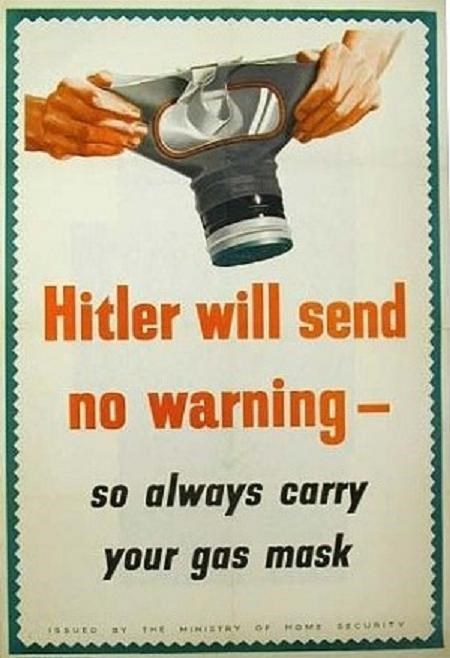
… We shall retaliate by drenching the German cities with gas on the largest possible scale.” As he said in 1919: Churchill had made it clear to his chiefs of staff that if Germany used chemical weapons, he would unleash Britain’s own gasses without mercy: “In the event of the Germans using gas on the Russians. (It’s a bad idea to use chemical weapons if the other side also has them, just as it’s a bad idea to use nuclear weapons if the other side has them.) Thus, a desire to avoid having German cities attacked with gas is the best available explanation for Hitler’s reluctance to use gas on the battlefield. But a more plausible explanation than “Hitler had a moral aversion to gassing people” (evidence from Auschwitz says otherwise) is that one of Hitler’s main opponents in the war, Winston Churchill, had long made it clear that he himself would not hesitate to use poison gas on an enemy. There is unfounded speculation that Hitler’s experience being gassed in World War I made him reluctant to deploy chemical weapons against soldiers, the theory apparently being that he was fine violently slaughtering them by any method so long as it didn’t irritate their lungs.
#Hitler ww1 gas mask full
Historians still do not know exactly why Hitler didn’t deploy his full chemical arsenal on the battlefield. To begin with, it is true that the Nazis had chemical weapons like sarin gas that they did not use. Notwithstanding that someone as prominent as the former head of Goldman Sachs could be ignorant enough to make the argument, Say What You Want About Hitler, At Least He Never Gassed Anyone, the “even Hitler didn’t use chemical weapons” observation runs into a number of problems.

And because these analogies to Hitler and Nazism can be very inflammatory, we have to think clearly about what they mean (the underlying message), and whether they are or aren’t appropriate. We want to make sure we never allow another Holocaust, therefore checking whether we are dealing with a new threat on the level of Adolf Hitler is probably prudent.īut it’s possible to get carried away. In a world haunted by the memory of the cataclysm Hitler caused, it would be shocking (and probably unhealthy) if we didn’t talk about Nazis a fair amount. World War II was probably the defining event of the last century-the last “good” war, it’s argued-and Adolf Hitler history’s greatest villain. Godwin’s law doesn’t say that Nazi analogies are bad or useless it is merely an amusing observation of their prevalence in online arguments. Godwin’s law of Nazi analogies posited that in any online discussion, the longer it went on, the more likely it would be that someone would invoke Nazis and Hitler. Amid speculation that Vladimir Putin might resort to using chemical weapons, Blankfein said it was “ worth noting even Hitler didn’t permit his military to use chemical weapons, though he had them.” This statement is reminiscent of what then White House Press Secretary Sean Spicer said in 2017, making a comparison with the Syrian President Bashar al-Assad: “You had someone as despicable as Hitler who didn’t even sink to using chemical weapons.” Wire creator David Simon echoed the point: “Possessing sarin gas, Hitler wouldn’t use it on soldiers even as his Reich fell.”įacile invocations of Hitler are everywhere these days. Lloyd Blankfein, the former head of Goldman Sachs, recently issued an asinine comment on the war in Ukraine.


 0 kommentar(er)
0 kommentar(er)
